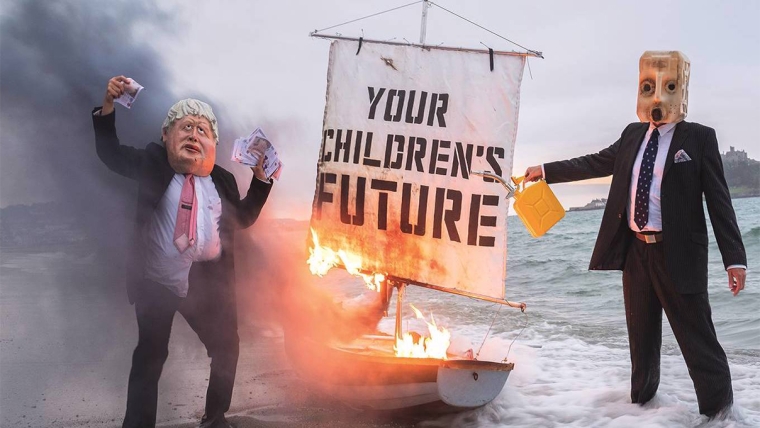
“Sustainability” is an increasingly popular term used to signal one’s virtue in contemporary public discourse, but it is a poor basis for sound public policy. It conveys a biologist’s view of the economy without any of the prudence that economists favour.
The biologist Paul R. Ehrlich gave exceptionally imprudent advice in his 1968 book, The Population Bomb, in which he suggested that humanity was heading for acute resource scarcities and mass starvation. What happened instead is that world income kept rising, as it had been doing for two centuries, and as it shows every sign of continuing to do. Pessimism has been a poor predictor.
As the British historian Thomas Macaulay presciently asked in 1830, “On what principle is it, that when we see nothing but improvement behind us, we are to expect nothing but deterioration before us?” It was a good question then, and it is an even better one now. Environmental fundamentalists who insist that “this time is different” are defying both logic and the historical evidence.
In terms of real (inflation-adjusted) income, the rate of “improvement behind us” has been about 2% per year on average. That might not sound like much, but it is a rate that produces astonishing results over the long run. It means that our great-grandchildren in 2100 will be over four times better off than we are today.
As such, economic prudence dictates that some resources, like oil, should be used as much as is profitable at the prevailing opportunity cost of extraction plus a carbon tax for spillovers. Other resources, such as hardwood, should be used now at a high “unsustainable” rate, because they will be worth relatively less to our much richer great-grandchildren. To deny today’s poor the hardwood to build their houses (or the income from chopping hardwood down) for the sake of later generations is not ethical. Indeed, it amounts to taking from the poor to give to the rich.
Beyond incomes, another key consideration is technology. Most of today’s “sustainability” talk is based on our current, feeble knowledge of the future. In the 1950s, futurologists predicted that we would have flying cars by now. We don’t, but we do have many other things that they never could have imagined. Hollywood screenwriter William Goldman’s famous observation about which films will succeed with future audiences applies equally to the future of technology: “Nobody knows anything.”
The reason is simple. If we knew, we would already know what we are going to know next year but do not know now. This basic contradiction cannot be evaded by handwringing about economic “headwinds,” and certainly not by the Precautionary Principle, which holds that we should not adopt any new products or processes whose full effects are unknown. A better name would be the Oblomov Principle, in reference to the 1859 Russian novel in which a nobleman who is incapable of decisive action simply stays in bed all day.
Anyone who thinks she knows the future should put her money where her mouth is. If you think a lack of sustainability will lead to scarcities of certain resources, you should be willing to bet everything in forward markets where those commodities are traded.
To his credit, Ehrlich did put his money where his mouth was. In 1980, he and the economist Julian Simon made a famous wager. Ehrlich chose five resources (copper, chromium, nickel, tin, and tungsten) that he thought would rise in price (adjusted for inflation) during the 1980s, and Simon bet him $10,000 that the prices would in fact fall.
Simon was banking on the prudent, elementary economic observation that if something becomes scarcer, there is a greater incentive to look for more of it or to invent some way out of the scarcity. If there is a housing shortage in some city, the smart money builds more houses to meet the increased demand (unless city-planning rules stand in the way, as is sadly the case in too many places nowadays).
But, more important, Simon was betting on the creativity of free people. It is this factor that explains the astounding Great Enrichment of the past two centuries, when standards of living in countries such as Finland and Japan improved by a gob-smacking 3,000%.
We owe this progress to the gradual spread of the liberal idea articulated in 1776 by Thomas Jefferson and, separately, by Adam Smith: namely, that all people are created equal. The liberals of that period did not promise equality of opportunity or outcome; they promised liberation from human coercion (here, the slave-owner Jefferson did not put his money where his mouth was). They imagined and then started to create a society where ordinary people could “have a go” without asking anyone’s permission.
Those who rose to the occasion built the world we now live in. They did it not with investment or exploitation but through innovation, broadly defined. Their feats could be as modest as a woman opening a hair salon in her neighborhood, or a poor man moving to California for work. And they could be as influential as a German nobleman (Wilhelm von Humboldt) inventing the modern university, a French gardener (Joseph Monier) inventing reinforced concrete, a North Carolinian trucker (Malcolm McLean) inventing containers for shipping, or a Swedish nurse (Aina Wifalk) inventing the modern upright walker.
Simon pointed out that there really is no such thing as a “resource.” The “ultimate resource,” as he put it, is human ingenuity, which has been gradually liberated since 1776. Rare-earth elements were merely interesting dirt until people started using them to build computers. Oil oozing from the ground was merely an agricultural nuisance until people learned how to make kerosene out of it.
In the end, Ehrlich lost the bet and paid up. The prices of all five commodities had fallen by 1990. Prudence won out over the kind of sustainability advocated by biologists and Swedish teenagers. To remain prudent about costs and benefits, we need to listen to engineers and economists. We need to be sensibly optimistic about technological breakthroughs, like the recently announced method of using E. coli bacteria to turn used plastic into vanilla flavoring (of all things).
As dyed-in-the-wool pessimists, most sustainability advocates don’t want to hear such things. To them, optimists who have confidence in the potential of modest geoengineering techniques – such as making all roads white to reflect the sun – are today’s Great Satans. So, too, are economists like the Nobel laureate William D. Nordhaus, who points out that because we will obviously have greatly enhanced technological abilities in the future, we can look forward to improved carbon-capture technologies rather than slamming the brakes on the industrial civilization that holds the key to our salvation.
Let’s be prudent and sensible, not sustainable and pathologically precautious.
Deirdre Nansen McCloskey, Professor Emerita of Economics and History at the University of Illinois at Chicago, is the author of Why Liberalism Works and Bettering Humanomics and co-author (with Art Carden) of Leave Me Alone and I’ll Make You Rich. Copyright 2021 Project Syndicate, here with permission.
11 Comments
Delusional, genocidal, awful.
So basically when you have no rational arguments - you go for name calling. Now that is awful.
Excellent article.
There's always more than enough for everyone, it's an issue with distributional efficiency.
Green fanatics creates further inefficiencies and distort the market.
Absolutely right freedom has always solved problems and produced creativity the oppressed and controlled produce nothing. Congratulations to interest.co for posting a positive and rational article.
There absolutely is enough to meet the needs of everyone. But it is global capitalism that has distorted the 'free market' - locking in power imbalances that keep countries in the global south poor and servile, preventing externalities being priced into production (transferring the costs of clean-up to the state), widespread corruption to further the interests of national / sectoral business interests, funding huge misinformation campaigns to maximise profits from harmful products (tobacco, fossil fuels, sugar).
Only thing is the problem is not scarcity of supply. Its the use of those resources impact on the environment. and the unequal distribution , where we have morbidly obese people in first world countries , and starving children in third world countries.
Fantastic article!
Who is the man on the right supposed to be ?
Reminds me of a favourite quote from another academic;
“American ideology, repeated ad nauseam by our leaders and reinforced by the media, incorporates the idea of bliss in a consumer society, so that a better world is chiefly one of greater material affluence for individuals.
This is the ideology we are selling around the world.
Along with a belief in a never-ending abundance of material goods, it includes the rhetoric of representative democracy, and blind trust in the powers of technology to overcome whatever problems that might be encountered along the way to a ‘free society’.”
Friedmann, J. (2000). The Good City: In Defense of Utopian Thinking. International Journal of Urban and Regional Research 24(2), 460-472
Wow, just wow.
So we're free to continue using finite resources in an infinite way?
I thought some posters were a bit over the top with their deriding economists thinking on finite resources. Ok so maybe not
You're just falling for the zero sum fallacy, growth is more about reducing waste, than increased consumption of resources, The Coca Cola can uses about 50% less aluminium and is stronger than it was when it first came out, all fueled by the desire to make more money, it grew as a company, but shrunk it's consumption of metal.
We can most definitely have infinite growth, because growth is not about consumption of a finite resource, it's about maximizing the utility of resources availiable to us, and that includes reducing, reusing and recycling existing resources.

We welcome your comments below. If you are not already registered, please register to comment
Remember we welcome robust, respectful and insightful debate. We don't welcome abusive or defamatory comments and will de-register those repeatedly making such comments. Our current comment policy is here.